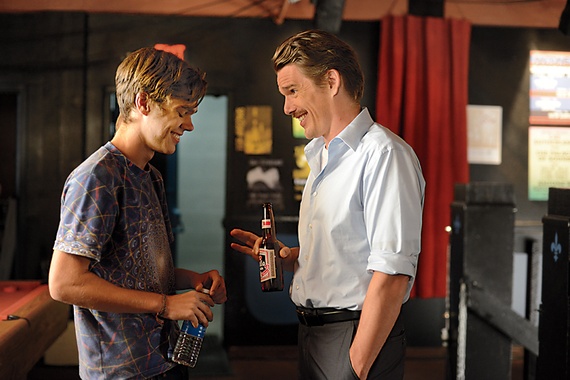Why Using a "Detective" Method is My New Favourite Way to Watch Movies
Here’s a great example of a “first-world problem”: there are too many movies I need to catch up on. Whether it’s independent movies, foreign films, classic titles or even recent releases, I often feel like I’m fighting a losing battle by trying to keep up with it all. And yes, there’s lots of trouble in the world, but when it does come time to pick something to watch, I sometimes worry I’m not well-versed enough to either appreciate a film I’m watching for the first time, or to write about it here on the site.
When I come across books like 1001 Movies You Must See Before You Die, I’m extra conflicted. On one hand, I love my copy of the book – it’s an excellent thing to have within reach for checking “significant” films off my list or considering the editors’ take on a particular title. But on the other hand, completing a 1001-film checklist seems like a daunting task. If you’re aiming to have a fairly balanced life (that is to say, one where you remember to have a job and go to sleep and live healthy), I’m not sure how many people could tick them all off.
With such a huge volume of titles, how do you pick one title over another? What’s the most comprehensive way to watch movies, one that gives you the best mix of culturally relevant, entertaining and educational titles? If you opt to watch everything alphabetically, you’re probably not going to have much fun. I’m still not sure of the answer, but recently I’ve been following a system I call the “detective method”, and for emerging cinephiles, it might be one of the best ways to catch up on all the important stuff we’re supposed to see.
What makes it a detective method? Just like a private eye in a 40s noir film solves a mystery by tracking down the people involved, I like to bounce from movie to movie by following the core cast and crew. Usually, I focus on the director or writer or the lead actors, and trace how their careers evolved over time. As I go, I fill out my mental picture of the person’s work, which I can then compare to others in the field.
But here’s the crucial part: I don’t power through one particular person at a time, or move chronologically through their back catalogue. Instead, I keep lots of “investigations” going constantly, which still gives me some freedom with what I watch. For example, let’s say I’m several movies behind on both Terrence Malick and Ben Stiller’s best work. If I’m in the mood for goofy comedy (rather than a lyrical head-scratcher), I’ll follow the Stiller lead. Malick’s film remains on the watch list, a loose end I’ll tie up in due time.
This method really takes on the aura of a detective story when I let one line of inquiry (say, the films of Paul Thomas Anderson) intersect with another (films featuring Philip Seymour Hoffman). There’s a special kind of thrill in revealing how individual movies are connected to others. The specific “truth” you’re chasing is never that clear, but there’s always a sense of learning more about the medium, and for anyone curious about why movies affect us in the way they do, expanding your film education is always appreciated.
Another way to describe this method might be to call it the “completionist” mentality (like one of Slate Magazine's culture columns), where you try to see as many films as possible within certain categories. I’m not sure, though, that watching every title under a particular label is the right way to look at it. When does exploring movies within a set of parameters go from an organic, enjoyable process to a quantitative marathon? As far as I know, there aren’t many real prizes for watching several thousand more movies than the next person, and having an encyclopedic memory of film trivia only gets you so far at parties (believe me, I’ve tried).
The other important qualifier for this detective method is determining which movies are significant enough to make the cut. It’s trickier than you might think, because if you follow too many “greatest films” lists, you’ll likely end up watching a huge amount of art house and foreign films, and miss out on the new, escapist movies that keep things fun.
My technique is to try and sample from as many online communities as possible - what critics are discussing, what regular people are talking about, and what I’m actually interested in myself. For example, just this past weekend, I took in two very different movies: Birdman (a current festival-circuit favourite and possible awards contender) and The Guest (a twisted and funny action/thriller/horror). I saw Birdman out of a desire to continue my “investigation” into director Alejandro G. Iñárritu and actor Michael Keaton, but I saw The Guest out of a desire to have some uncomplicated fun.
It’s worth pointing out that being a movie detective to its fullest, most meticulous extent isn’t for everybody. But I believe even the most casual viewers could attempt a scaled-down version and expand their movie-watching range, and have a good time doing it. It all comes down to giving the same weight to the behind-the-scenes aspect (the people who make these works) as we do to characters, plot and genre. Remember – if we don’t work on refining our tastes, we’ll get the fifth Transformers film we all deserve.
-
How do you go about choosing which movies to watch? Do you rely only on gut instinct? Do you swear by the RottenTomatoes and Metacritic scores? Join the discussion in the comments section, and if you liked this post, share it with your friends and followers!

